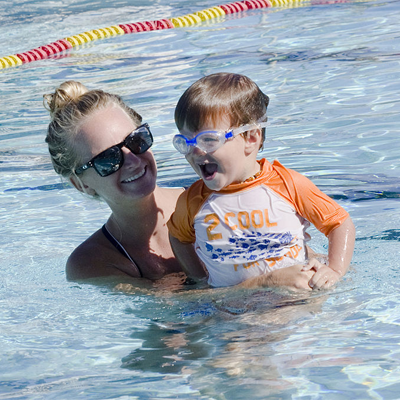
Many children naturally love water. It may be frightening to them at first, but it is sheer joy we see on the faces of children jumping into the water in the summertime. In warm climates, many children learn in the toddler and preschool due to culture and access to warm bodies of water.
Parents with pools can either block the pool or teach their child(ren) to swim early. I learned at 18 months to tread water, come to the surface after jumping in fully clothed with shoes, and swim. This is now called Rescue Swim, and lessons are offered in some areas. Rescue Swim is intended for babies and toddlers who live with daily access to water such as by a lake or pool. They provide the child with the necessary tools to save himself or herself from drowning if they should happen to fall into the water. Anyone can google videos of this process. It is both terrifying and awe-inspiring.
For older children and classic swimming, exposure and encouragement work best. A paid teacher is not necessary. An experienced older teen or adult swimmer can easily provide a child with what they need to know. Then a child comes to the important part of learning to swim: practice! Our child was swimming at 2, independently at 3, simply due to amount of exposure to the water since we live in such a warm area. If you want your child to begin learning swimming techniques for sport, exercise, or simply knowledge, a swim coach is so helpful. They can teach swim strokes, proper form, speed, and many other aspects of swimming. Local YMCA’s are a good place to find a swim coach. There are also private coaches who teach from their own pools or come to yours. It is helpful to have a friend or family referral, or to inquire about classes to neighbors or on community sites before looking someone up and scheduling.
If you’re considering swimming lessons for your child this summer, things to consider include availability of lessons, free time for the classes and practice, how much your child will have access to a pool in order to practice the skills they will learn, and finally, the level of motivation. If a child really wants to learn something, most often they will. Finally, one thing to remember is that fear of the water is not a reason to avoid lessons. It is a challenge that can be easily overcome with some work and helps provide the child with a sense of achievement and pride in overcoming those fears!
